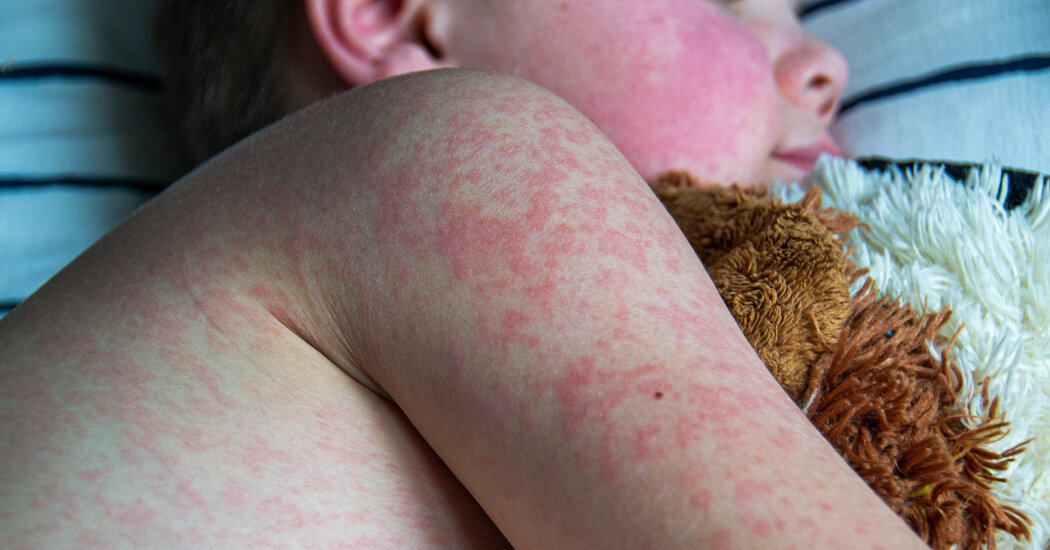There have now been 64 measles cases in the United States this year, surpassing the total of 58 cases in all of 2023, according to new data from the Centers for Disease Control and Prevention.
The rise in cases should “alert us, rather than alarm us,” said Dr. Demetre Daskalakis, director of the National Center for Immunization and Respiratory Diseases at the C.D.C. Most communities across the country have vaccination rates high enough to have robust protection against the highly contagious virus, he said. Even after the increase, the number of cases is still significantly lower than it was in 2019, when more than 1,200 people were infected, more than two-thirds of whom were children.
But health experts said the milestone is a distressing reminder that even though there is an effective vaccine against the virus, measles remains a persistent threat to public health.
What’s driving the spread of measles
Doctors say there are several factors contributing to the spread of measles, cases of which have climbed across the globe in recent years. Many cases reported in the United States this year were linked to international travel, according to the C.D.C., as travel destinations such as Britain, Austria and the Philippines have had outbreaks. Many of the people in the United States who have been infected have been unvaccinated children age 12 months and older.
Routine childhood vaccinations, including the two-dose vaccine that protects against measles, mumps and rubella, stalled once the pandemic started. At the same time, vaccine hesitancy has become more commonplace, said Dr. Paul Offit, a vaccine expert at the Children’s Hospital of Philadelphia. Generally, a community is protected against measles if more than 95 percent of people in it are vaccinated. But state-required vaccinations among kindergartners in the United States fell from around 95 percent in the 2019-20 school year to roughly 93 percent in the 2022-23 school year.
That gap in vaccination has left about 250,000 kindergartners vulnerable to measles annually for the past three years, according to the C.D.C. The rate of vaccine exemptions for children has also increased, underscoring the challenges vaccine hesitancy presents.
“People use the term, ‘personal choice,’ ‘individual freedom,’ ‘bodily autonomy’ — this is a contagious disease,” Dr. Offit said. “You’re making a decision for yourself and others with whom you come incontact.”
Barriers to accessing the shots may also be partly to blame for growing cases in the United States. Experts said that some parents may not be aware that they may be able to have their children vaccinated for free, either through private insurance or through the Vaccines for Children Program.
Parents might also wrongly assume “that measles is a mild disease,” said Dr. Sean O’Leary, a professor of pediatrics-infectious diseases at the University of Colorado School of Medicine. Most cases cause fevers, cough, runny noses, red eyes and a telltale rash. In some cases, people can develop pneumonia and brain swelling that leads to deafness or intellectual disabilities. “It is potentially a very severe disease,” Dr. O’Leary said.
About one in five people in the United States who are infected with measles and not vaccinated end up hospitalized, according to the C.D.C. And as many as one in 20 children with measles develops pneumonia, the most common cause of death from measles in young children.
So far, cases have appeared in at least 17 U.S. states: Arizona, California, Georgia, Illinois, Indiana, Louisiana, Maryland, Michigan, Minnesota, Missouri, New Jersey, New York, Ohio, Pennsylvania, Virginia, Washington and Florida.
In Florida, the state surgeon general released guidance that contradicted widespread medical advice and allowed parents to send unvaccinated children to school amid a measles outbreak.
How to protect against measles
Vaccination is “the most powerful thing” parents can do to protect their children against measles, Dr. Offit said. Two doses of the vaccine are about 97 percent effective at preventing measles. The C.D.C. typically recommends that children receive the first dose starting at age 1 and the second dose starting at age 4. In some cases, though, especially when outbreaks are spreading, children under 1 may be able to get vaccinated, Dr. Daskalakis said.
On Monday, the C.D.C. issued a health advisory encouraging parents to vaccinate children older than six months before traveling internationally, regardless of their destination.
Doctors may recommend against vaccination for certain people with compromised immune systems, like those undergoing chemotherapy.
Dr. Daskalakis encouraged parents to talk to their pediatricians about vaccination. Those kinds of conversations — parents seeking health information directly from doctors that they trust — can be a vital tool in what Dr. Daskalakis views as an “uphill battle.”
“Given the impact on vaccine confidence that we’ve seen after Covid, and during Covid,” he said, “I think we have to just keep that drumbeat going.”







